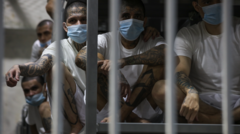In a bold move, President Bukele of El Salvador has offered to repatriate a group of 252 Venezuelans deported from the United States in return for the release of political prisoners held in Venezuela, highlighting ongoing tensions surrounding justice and human rights in both nations.
El Salvador Proposes Prisoner Swap with Venezuela Involving Deported US Nationals

El Salvador Proposes Prisoner Swap with Venezuela Involving Deported US Nationals
El Salvador's President Nayib Bukele suggests a humanitarian deal to exchange Venezuelan deportees for political prisoners, raising questions of justice and human rights.
El Salvador's President Nayib Bukele has made an audacious proposal for a prisoner exchange, offering to repatriate 252 Venezuelans currently incarcerated in El Salvador in exchange for the release of an equal number of political prisoners held by the Venezuelan government. Bukele emphasized on social media that many of these deportees had been accused of serious crimes such as "rape and murder," contrasting their situations with those of Venezuelan political prisoners, who he claims are imprisoned solely for opposing President Nicolás Maduro's regime.
In response, Venezuelan chief prosecutor Tarek William Saab took issue with Bukele’s offer, demanding clarification on the legal status of the deportees, including charges against them and whether they had received fair representation in court. The Venezuelan administration rejects the existence of political prisoners, which is a claim hotly contested by various human rights organizations.
In his appeal to Maduro, Bukele emphasized the humanitarian nature of his proposal. He aimed to facilitate the repatriation of all deported Venezuelans while also addressing the plight of prisoners in Venezuela. He suggested that as part of the agreement, nearly 50 prisoners of other nationalities, including U.S. citizens, should also be considered for exchange.
The backdrop to this proposal involves the more than 200 Venezuelans recently deported from the U.S. to El Salvador, with the Trump administration accusing them of affiliations with the Tren de Aragua gang. The U.S. government subsidizes the detention of these individuals in El Salvador’s notorious Terrorism Confinement Center, which is notorious for its harsh conditions.
Bukele, who has dubbed himself "the world's coolest dictator," has seen rising popularity for his aggressive anti-gang measures since his re-election last year. Meanwhile, Maduro has publicly condemned the U.S. deportation policies, labeling them as inhumane and a violation of human rights.
Recently, legal challenges to Trump's immigration policies have surged, with a U.S. Supreme Court ruling halting the deportation of additional Venezuelan nationals alleged to be gang members. The Biden administration has termed the ongoing challenges to the deportation authority as "meritless litigation," further complicating the landscape of international relations regarding immigration from Venezuela.
As tensions mount between El Salvador and Venezuela, and amid escalating critiques of both leaderships, Bukele's proposal raises complex issues surrounding international law and human rights activism. The world watches closely as this potential exchange could set a significant precedent in diplomatic relations.


















